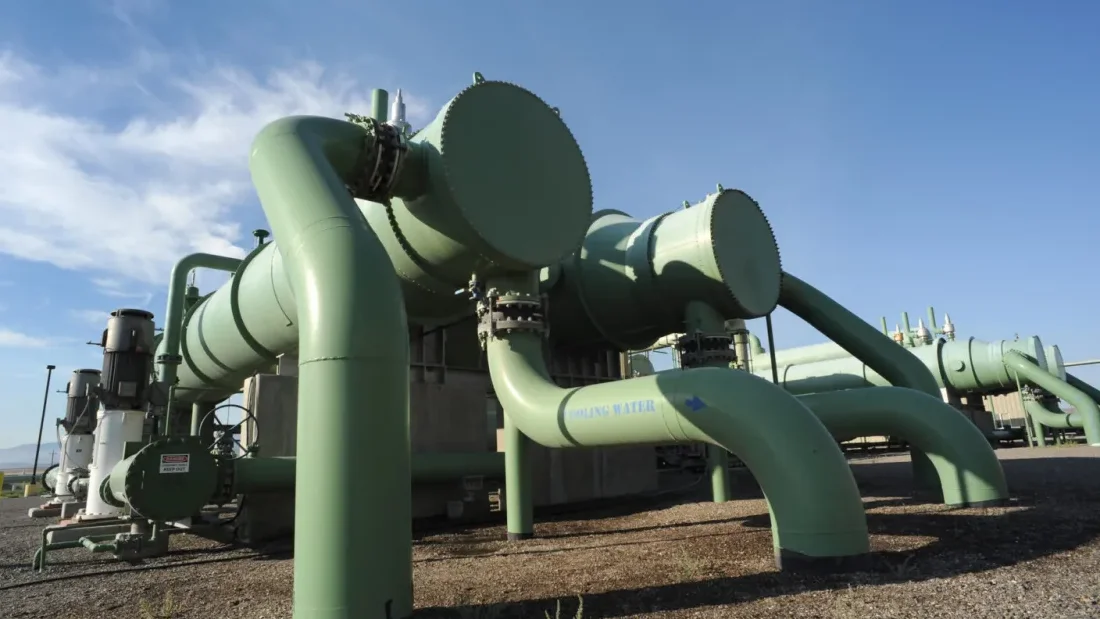
HYDROGEN: Backers of a planned hydrogen-powered iron production facility in Minnesota say they are confident that $1.3 million in federal funding just announced for the project will survive the Trump administration’s spending freeze. (Star Tribune)
CLIMATE: The Trump administration’s freeze on federal grants and loans could jeopardize funding for several climate and pollution-reduction projects for northeastern Ohio organizations. (Cleveland.com, subscription)
EFFICIENCY: Twenty-four states lack energy efficiency standards meant to curb energy use, which advocates say come with economic as well as climate advantages, according to a new industry report. (Grist)
OIL & GAS: A state-backed report in North Dakota says higher federal tax incentives for using carbon dioxide for enhanced oil recovery could unlock up to 8 billion more barrels of oil and generate $9 billion in more oil tax revenue over the next decade. (North Dakota Monitor)
EMISSIONS: U.S. Transportation Secretary Sean Duffy signs an order seeking to roll back fuel economy standards enacted by President Biden, arguing that “artificially high” fuel efficiency rules raise costs for consumers. (New York Times)
CLEAN ENERGY: Food and beverage production facilities across the U.S. begin to deploy low-carbon heating technologies as an alternative to gas-powered systems, though high costs remain a barrier. (Canary Media)
NUCLEAR: An Indiana utility will seek a $50 million U.S. Department of Energy grant to begin exploring the potential for a small modular reactor at a retiring coal plant. (Inside Indiana Business)
COAL: Springfield, Illinois, reaches an agreement with the U.S. EPA over two coal ash disposal sites that will require improved groundwater monitoring and addressing potential releases of heavy metals. (Environmental Protection)
BIOFUELS: Kansas agriculture and energy companies ask state lawmakers to approve a $5 million annual state tax credit to entice reluctant gas station owners to distribute more ethanol made with crops grown in-state. (Kansas Reflector)
SOLAR:
BIOMASS: Michigan biomass energy advocates say a new state law eliminating biomass as a clean energy source eliminated a market for burning old tires. (MLive, subscription)
COMMENTARY: A former Iowa lawmaker says restrictive local ordinances hinder the state’s ability to remain a renewable energy leader, particularly as new demand comes online from data centers. (Des Moines Register)

EFFICIENCY: A new report finds utilities in Tennessee and other Southeast states have the lowest energy efficiency ranking of any region in the U.S. (Tennessee Lookout)
OIL & GAS: Texas regulators adopt updated oilfield waste rules that now cover drill cuttings, mud that oozes from wells and the wastewater that comes to the surface during fracking. (Inside Climate News)
SOLAR: A 900 MW Texas solar farm uses roughly 3,000 sheep to maintain vegetation at its 4,000-acre site, illustrating a broader trend pairing livestock with solar energy development across the U.S. (Associated Press)
POLITICS:
COAL:
ENVIRONMENTAL JUSTICE:
GRID:
CARBON CAPTURE: The U.S. EPA approves West Virginia’s request for primary enforcement authority for the drilling of injection wells for carbon capture projects. (Charleston Gazette-Mail)
EMISSIONS:
COMMENTARY:

POLITICS: On his first day in office, President Trump declares a national energy emergency to give himself broad powers to encourage fossil fuel production to meet growing power demand, though the move could face legal challenges. (The Guardian, The Hill)
ALSO:
ELECTRIC VEHICLES:
WIND: Trump orders a stop to new permitting for onshore and offshore wind projects and directs the Interior Department to find out whether it can end or amend existing leases. (E&E News)
OIL & GAS: Trump issues executive orders aimed at spurring more oil & gas drilling in the Arctic National Wildlife Refuge and revoking policies that “burden the development of domestic energy resources.” (The Hill)
OVERSIGHT: President Trump names a longtime Virginia utility regulator to lead the Federal Energy Regulatory Commission. (Cardinal News)
SOLAR:
CLIMATE: A study shows how fossil fuel companies collaboratively used Twitter to seed doubt about international climate action. (Grist)
GRID: Illinois lawmakers and advocates are drafting legislation that would allow merchant transmission line developers to access subsidies under the state’s renewable energy credits program to help remove cost barriers for wind and solar developers. (Energy News Network)
EFFICIENCY: A new report finds utilities in Tennessee and other Southeast states have the lowest energy efficiency ranking of any region in the U.S. (Tennessee Lookout)

CLIMATE: Michigan climate officials say the state is on track to cut greenhouse gas emissions by 26% over 2005 levels by the end of 2025 and is on pace to reach a carbon neutrality goal by 2050. (Michigan Public)
PIPELINES:
NUCLEAR: Officials at a northern Michigan electric cooperative want to buy power from a nuclear plant slated to restart this year, in part to help meet the state’s climate goals a decade ahead of time. (Interlochen Public Radio)
ELECTRIC VEHICLES:
UTILITIES: Ameren Missouri customers push back on the utility’s proposed 15% rate increase that executives say is needed to pay for various grid infrastructure investments. (St. Louis Public Radio)
SOLAR:
CLEAN ENERGY: Rural Minnesota electric cooperatives receive more than $17 million in federal funding for renewable energy projects and load management through virtual power plants. (KIMT)

PIPELINES: Declining residential demand for propane and escalating costs of a tunnel in the Straits of Mackinac cast doubt on the future of Line 5, according to a new study by an energy economics organization. (Michigan Advance)
ALSO:
RENEWABLES: Two North Dakota utilities receive a combined $1.57 billion to add thousands of megawatts of renewable energy under an Inflation Reduction Act program. (KXNET)
CLIMATE: The future of Des Moines, Iowa’s climate change programs are uncertain after officials eliminated the city’s office of sustainability to help plug a $17 million budget deficit. (KCCI)
NUCLEAR:
SOLAR: The Ohio Supreme Court is weighing the fate of four utility-scale solar projects as the state faces a spike in electricity demand from data centers. (Cleveland.com, subscription)
GRID: American Electric Power will sell a nearly 20% stake in two Midwest transmission subsidiaries for $2.82 billion to fund investments in transmission, distribution and generation projects. (Utility Dive)
EMISSIONS: Efforts to decarbonize large commercial vehicles like semi-trucks and school buses could be in jeopardy under the Trump administration, creating public health risks and derailing climate measures, advocates say. (Inside Climate News)
BIOFUELS: Iowa biofuel advocates say the Biden administration’s failure to finalize sustainable aviation fuels tax credits leaves the guidelines unclear as the Trump administration takes over. (Iowa Capital Dispatch)
ELECTRIC VEHICLES:
COMMENTARY: Minnesota should lift its moratorium on new nuclear plant construction to help attract large data centers, writes the head of a Minnesota private equity firm. (Star Tribune)

COAL: Despite touting investments in renewable energy, Warren Buffett’s Berkshire Hathaway owns 12 of the dirtiest coal plants in the country, including in Nebraska and Iowa, an analysis of federal emissions data finds. (Reuters)
CLEAN ENERGY:
PIPELINES: The Michigan Court of Appeals hears arguments from tribes and environmental groups challenging a state permit allowing Enbridge to build a tunnel for Line 5 in the Straits of Mackinac. (Michigan Advance)
CLIMATE:
SOLAR:
GRID:
POLITICS: Former Illinois House Speaker Michael Madigan concludes 12 hours of testimony over four days in his corruption trial that addressed quid-pro-quo allegations involving jobs with associates at ComEd. (Chicago Sun-Times)
BIOFUELS: Some Iowa biodiesel plants have at least temporarily shut down after the Biden administration failed to finalize guidance on a new tax incentives program. (Des Moines Register)

TRANSPORTATION: California abandons regulations aimed at phasing out diesel trucks and requiring cleaner locomotives, saying the incoming Trump administration is unlikely to issue waivers allowing the rules’ implementation. (CalMatters)
ALSO:
PUBLIC LAND:
NUCLEAR: Wyoming regulators greenlight construction of non-nuclear portions of TerraPower’s proposed advanced reactor facility in the southwestern part of the state. (WyoFile)
CLIMATE:
UTILITIES:
GRID: Federal data show utility equipment has sparked more than 3,600 California wildfires since 1992, but the cause of the deadly Los Angeles blazes remains under investigation. (New York Times)
OIL & GAS: Colorado advocates push back on proposed natural gas and produced water pipelines on federal land in the western part of the state. (Post-Independent)
SOLAR: Washington state officials say a 2017 law aimed at encouraging solar panel recycling has yet to be enforced and has driven some manufacturers from doing business in the state. (Seattle Times)
HYDROGEN: A report finds California lost a net total of three light-duty hydrogen fueling stations last year, casting doubt on the state’s ability to meet targets. (RTO Insider, subscription)
OVERSIGHT: A Utah city considers revising its land-use code to encourage solar, energy storage, natural gas and small modular nuclear reactor development. (Deseret News)
POLITICS: Montana Gov. Greg Gianforte announces a new task force aimed at developing ways to “unleash” energy development and production. (Montana Free Press)

EMISSIONS: More than a dozen states — including most of the Northeast — expect President-elect Trump to take away their authority to impose stringent rules on motor vehicle emissions in line with California’s regulations. (New Jersey Monitor)
POLITICS:
NUCLEAR: As New York faces rising power demand and the need to lower greenhouse gas emissions, it’s taking a serious look at the possibilities of advanced nuclear power plants. (Inside Climate News)
SOLAR:
GRID: A new study of the New England power system finds the region’s reliance on natural gas power generation poses risks in case of an extended cold snap or gas infrastructure problems. (RTO Insider, subscription)
OFFSHORE WIND: Offshore wind development can be responsibility sited and managed to avoid hurting bird populations, says the National Audubon Society. (news release)
ELECTRIFICATION: Burlington, Vermont’s electric department announces expanded rebates for heat pumps, used electric vehicles, e-bikes, and other electric appliances and equipment. (news release)
COMMENTARY: Connecticut should follow in New York and Vermont’s footsteps and pass legislation to make fossil fuel companies pay for the damages caused by climate change, says an environmental activist. (CT Mirror)

A planned 325-megawatt battery energy storage system at a key location on New England’s power grid could boost Connecticut’s access to carbon-free power — but only if it can overcome complicated legal and political barriers.
An Israeli firm, Sunflower Sustainable Investments, filed an application in October for the project with the Connecticut Siting Council, which has regulatory authority over the siting of power facilities.
The $200 million project, called Windham Energy Center, would be located on a largely undeveloped 63-acre site in Killingly, Connecticut, that was slated for construction of a fossil fuel power plant a few years ago. There is existing electric transmission infrastructure immediately adjacent to the site, and the project will connect to the grid via a 345-kilovolt transmission line.
A spokesman for Windham Energy, Jonathan Milley, said the location is ideal for a battery facility.
“If you look at the topology of the New England grid, this is at the intersection of the Millstone nuclear power plant and Brayton Point,” in Somerset, Massachusetts, where approved offshore wind projects will eventually be connected to the grid, Milley said. “This nodal location will at certain times of the day and under certain conditions have some of the lowest cost energy available to it on the grid.”
The project would consist of lithium-ion batteries installed in racks in prefabricated containers, and a switching station operated by Eversource to connect them to the transmission line. The equipment would be located within 20 acres of the total project site.
But the project is currently hung up by an administrative roadblock. That’s because in 2019, the siting council approved an application from NTE Energy to build a 650-megawatt natural gas plant on a portion of the same property.
That project, which ran into a storm of opposition from environmental advocates, was never built, and NTE Energy has since dissolved. But nevertheless, on Nov. 8, the siting council’s executive director, Melanie Bachman, notified Windham Energy that it is “premature” for the body to review their application because the Certificate of Environmental Compatibility and Public Need previously issued to NTE still exists.
The certificate has not been surrendered to the council, she said. And it will otherwise only be void if construction on the gas plant has not been completed by September 28, 2026.
Windham Energy has asked the council to declare the certificate no longer valid, noting that NTE Energy no longer exists nor holds an option to purchase the property, and that its energy supply agreement with regional grid operator ISO-New England was also revoked in 2022.
Milley said battery storage is needed to complement the state’s offshore wind goals; the batteries can store surplus energy from wind sources when production is high, and then dispatch it to the grid when it is needed. In 2021, state lawmakers set a goal of at least 1,000 megawatts of energy storage deployment by December 31, 2030.
“If there’s a developer willing to build what the state is looking for and not asking for anything else, it doesn’t seem like asking too much for the council to nullify an existing certificate for an entity that doesn’t exist,” Milley said.
For now, counsel for Windham Energy has sent a letter by certified mail to Stephanie Clarkson, who they say is the last known contact for NTE Energy, asking her to “advise whether the Certificate issued to NTE should be an impediment” to their proposed project.
The town of Killingly has requested party status in the hearings before the siting council.
In a letter to Windham Energy following a meeting with the developers, Town Council chair Jason Alexander and vice chair Tammy Wakefield raised concerns about the potential for fire at the facility, pointing to a recent fire at a battery storage facility in New York, and asked how they would prevent a similar event.
Three battery storage projects caught fire in New York in 2023, prompting Gov. Kathy Hochul to convene a working group to draft updates to the state’s fire code to improve safety and emergency preparedness in the planning of such projects.
Other towns in Connecticut have also raised concerns about fires for much smaller battery storage projects proposed by Key Capture Energy, of Albany, New York.
Milley says town officials are “right to ask these questions,” and he is focused on addressing their concerns. He noted that Windham plans to use lithium iron phosphate batteries, a type of lithium battery he says is much less prone to fire.
“The element in the battery is iron, which doesn’t burn,” he said.
However, he added, Windham fully intends to work with town and state fire authorities to develop a response plan “whether it’s a strict requirement or not.”
In the meantime, Windham Energy has filed a motion with the siting council to reopen the docket concerning NTE Energy so that it might modify its decision and revoke the earlier issued certificate.
The council is expected to take up that motion during its Feb. 6 meeting.

OIL & GAS: Oil and gas companies move to expand pipelines across Virginia as the rapidly growing number of data centers strain energy demand and existing infrastructure. (Virginia Mercury)
ALSO:
TRANSITION: A Texas electric cooperative will convert a coal-fired power plant into a solar and battery facility, aided by more than $1.4 billion in federal funding to support clean energy and maintain rural jobs. (Texas Tribune)
GRID: The private company that oversees Puerto Rico’s power grid announces it’s restored power for 98% of its 1.47 million customers after a blackout knocked out power across the island on New Year’s Eve. (Associated Press)
SOLAR:
WIND:
COAL:
ELECTRIC VEHICLES: A Virginia lawmaker will again introduce a bill to establish funding incentives for companies to build electric vehicle charging stations in rural parts of Virginia. (Cardinal News)
OVERSIGHT: A clean energy nonprofit sues Georgia regulators for allegedly violating an open records law after the state fails to turn over public records from a state board member who the group claims used her personal email and cellphone for public business. (Atlanta Journal-Constitution)
CLIMATE: A family’s experience with Hurricane Helene and its aftermath illustrates how climate-exacerbated extreme weather disproportionately affects undocumented residents. (NPR)
UTILITIES:
POLITICS:
COMMENTARY: A Virginia legislative commission’s report confirms the booming data center sector will triple power demand over the next 15 years, threatening not just the state’s emission reduction goals, but its ability to produce that much power even without them, writes a columnist. (Virginia Mercury)